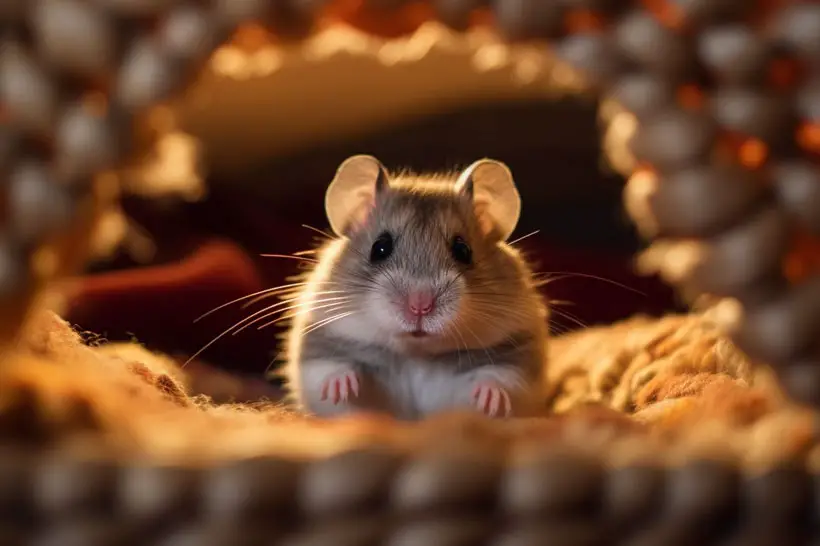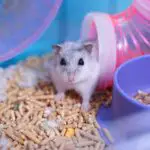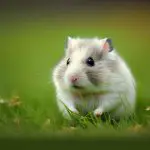Russian Dwarf Hamster Lifespan: How Long Do They Live
Looking for a pint-sized pet that packs a big personality? Meet the Russian Dwarf Hamster! With low maintenance and an energetic personality, these winter white dwarf hamsters are one of the most popular pet choices. But like most popular pets, they don’t live that long.
So, the question arises, how long do they live? The Russian Dwarf Hamster lifespan ranges from one to three years. In the wild, they live just for about a year. But in the house, with proper care and diet, they live for even more.
You must know this to provide them with the best care and ensure your new pet’s long and healthy life. That is why we are here with all the information about these winter hamsters’ lifespans.
Russian Dwarf Hamster Lifespan: How Long Do They Live
Russian Dwarf Hamster, also known as Winter White Dwarf Hamster, is a popular beginner-level pet. They look like small balls of fur. If you look closely, you will see that they have, thick, dark grey dorsal stripes and furry feet.

Russian dwarf hamster size ranges from 3-4 inches and weighs about 4 ounces. Different hamsters have life expectancies of different types. The average lifespan of a Russian Dwarf Hamster is around 1.5 to 2 years.
However, with proper care and a healthy lifestyle, some Russian Dwarf Hamsters may even live up to 3 years.
That is to say, the male and female species’ life expectancy actually varies. Here is a table about that:
| Gender | Average Lifespan |
|---|---|
| Male | 1.5 – 2 years |
| Female | 2 – 3 years |
Comparison of Different Dwarf Hamster Lifespan

According to the Guinness Book, the longest living dwarf hamster lived for 4.5 years. But not all dwarf hamsters have the same life expectancy. Campbell and Chinese Dwarf Hamster have the least life expectancy among all of them. They live up to only 2 years.
Syrian Hamster and Roborovski Hamster live up to 3.5 years. So you say that the Russian Dwarf Hamster has a moderate life expectancy.
Factors that Influence Russian Dwarf Hamster Lifespan

Like most things, the lifespan of a Russian dwarf hamster actually depends on a lot of factors. They are:
Genetics
Genetics plays a vital role here. If the hamster’s parents had a long lifespan, there is a greater chance that the offspring will have a longer lifespan as well. Apart from that, certain genetic factors can predispose a hamster to develop certain health conditions.
For example, some genetic mutations in hamsters can increase the risk of developing tumors. Additionally, some Russian Dwarf Hamsters may have a genetically low immune system or health issues. These factors highly influence their life.
Diet
A well-balanced diet is important for any pet. A Russian Dwarf Hamster’s diet consists of a combination of commercial hamster food and fresh foods. You can buy commercial food from any pet store. It is a specifically formulated food for hamsters that usually contains a variety of seeds, grains, and pellets.

Supplement to that you should give them fresh foods such as vegetables, fruits, and small amounts of lean protein. Here is an overview of their diet chart you can follow:
| Food Type | Frequency | Portion Size |
|---|---|---|
| Commercial Food | Daily | 1-2 tablespoons |
| Fresh vegetables like carrots, broccoli, and cucumber | 2-3 times per week | a few small pieces |
| Fresh fruit like apples, bananas, and grapes | 1-2 times per week | A small amount |
| Fresh herbs like parsley, cilantro | 1-2 times per week | a few leaves |
| Hard-boiled egg | 1-2 times per week | a quarter of an egg |
| Mealworms or other live insects | 1-2 times per week | 2-3 insects |
| Freshwater | Daily | Accessible at all times |
Environment
The environment also impacts the lifespan of these hamsters. In a comfortable living environment, they thrive and stay in a happy mood. That is why a pet Russian Dwarf Hamster lives longer than a wild one.
Russian Dwarf Hamster’s natural habitat is in the semi-arid regions of Central Asia. In that wild environment, hamsters have to protect themselves from predators and search for food and shelter. That takes a toll on them.

However, if you give them an environment with a spacious and clean cage, good temperature, and light, it won’t give them any stress. In this type of environment, your mini hamster will live more than it did in the wild.
Exercise
Surprisingly, exercise also affects the Winter Dwarf Hamster Lifespan. Regular exercise is an essential aspect of keeping a Russian Dwarf Hamster healthy. Hamsters are natural runners. So, they require adequate space and exercise equipment, such as a wheel or running ball, to stay active.
Providing your hamster with a stimulating and enriched environment can encourage them to be more active and improve. It will improve their overall health and well-being. However, be sure that your pet doesn’t indulge in overexercising.
Common Health Issues of Russian Dwarf Hamster

As a responsible pet owner, you need to properly take care of your pet. And to do this you need to know what type of issues your pet hamster might have.
- Dental problems
- Respiratory infections
- Wet tail or diarrhea
- Skin problems like mites or fungal infections
- Eye infections
- Tumors whether benign or malignant
Symptoms
There are a few symptoms you need to look out for. If you see them in your pet hamster, you need to take them to a vet. They are:
- Loss of appetite or thirst
- Wheezing, sneezing, or labored breathing
- Changes in fur or skin like bald patches, flaky skin, or matted fur
- Abnormal discharge from eyes, nose, or ears
- Changes in feces or urine
How to Tell if a Russian Hamster is Dying?

Russian Dwarf Hamster lifespan in the house is pretty long. But that being said they can die early due to stress or disease. It can be difficult to tell if a Russian Dwarf Hamster is dying, but here are some signs to watch for:
- If the Russian Dwarf Hamster stops eating or drinking, it could be a sign of illness or pain
- If your hamster is not as active or sleeping more than usual
- Struggling to intake air
- Prominent Weight loss
Conclusion
For a miniature creature, these Winter Dwarf Hamsters live quite the life. The Russian Dwarf Hamster lifespan depends on how you treat it. If you care for it, give it a suitable place to live, and the rodent will live a full life.
By learning about their diet, exercise needs, and common health problems you can be the responsible pet owner for your hamster needs. If you see your hamster is acting unusual, take it to a professional. Learn more about them and have a soothing experience of owning a pet.




